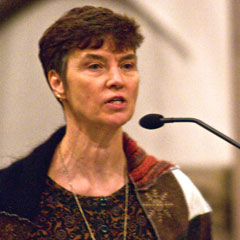Margaret O’Gara, Professor of Theology at the University of St. Michael’s College, entered the realm of eternal life on Thursday, August 16, at age 65, after suffering from cancer for two years.
The characteristic aim of Margaret’s 37 years of work as a theologian was to foster dialogue among Christians for the sake of overcoming divisions between the churches. Besides her teaching, research, writing, and extensive public lecturing, she was a member of official ecumenical dialogues in Canada, the United States, and at the international level. She also served as president of the North American Academy of Ecumenists and the Catholic Theological Society of America. From 2009 to 2012 she served on the board of Bridgefolk.
Margaret’s unusual effectiveness in these professional arenas came from a combination of her scholarly rigor, her exceptional ability to listen sympathetically, her uncommon energy, and her contagious delight at the growth of mutual understanding and friendship. The same traits marked her strong personal relationships with her students and colleagues, the members of her extended family, and her many longstanding friends. Beneath everything else, the fundamental driving force of her life was her deep and abiding Christian faith.
Visitation at Rosar-Morrison Funeral Home, 467 Sherbourne Street in Toronto, on Wednesday, August 22, from 2:00 to 9:00pm, with a prayer service at 7:30pm. Funeral mass at St. Basil’s Church on Thursday, August 23, at 10:30am. Burial in Breckenridge, Minnesota.

